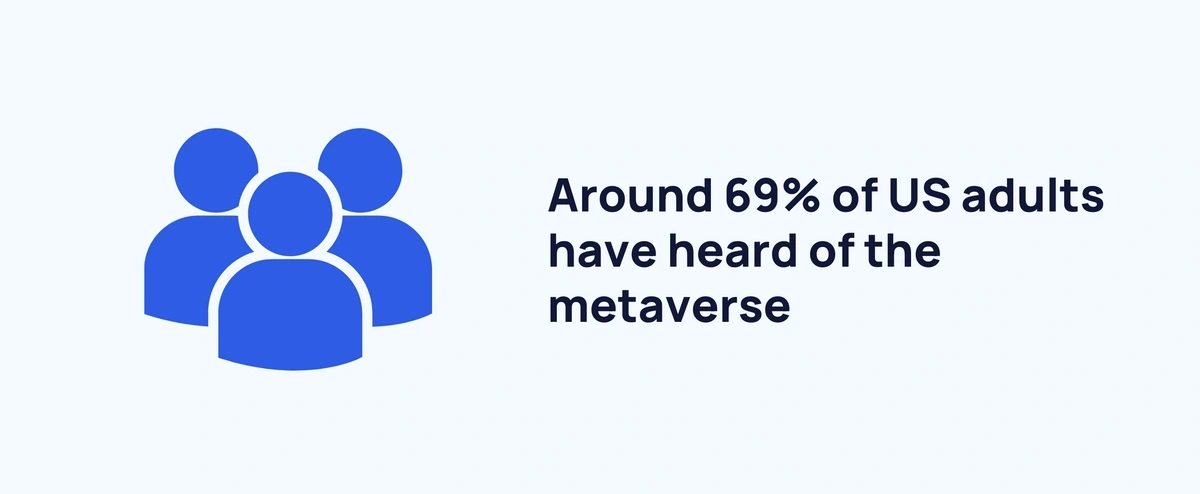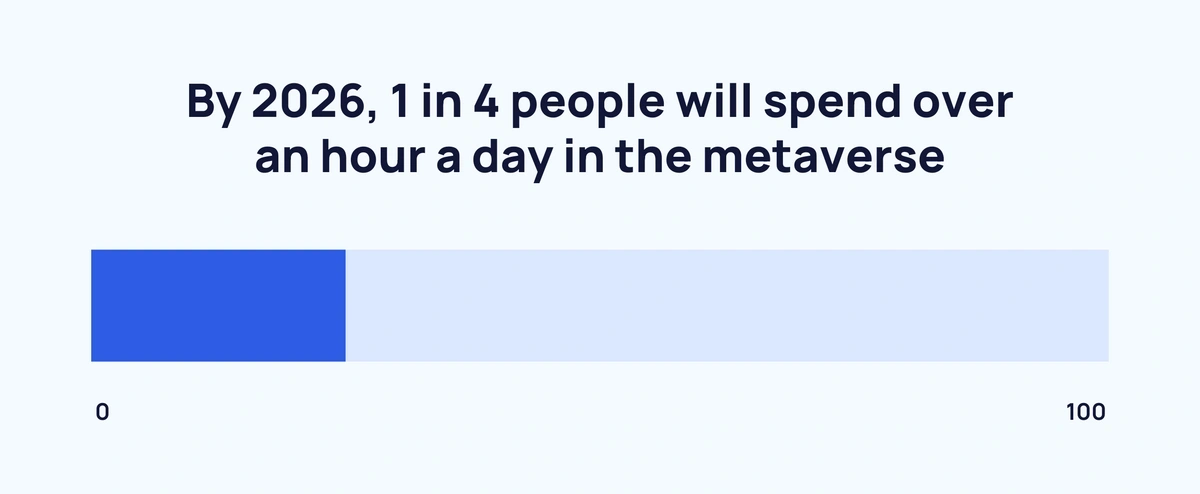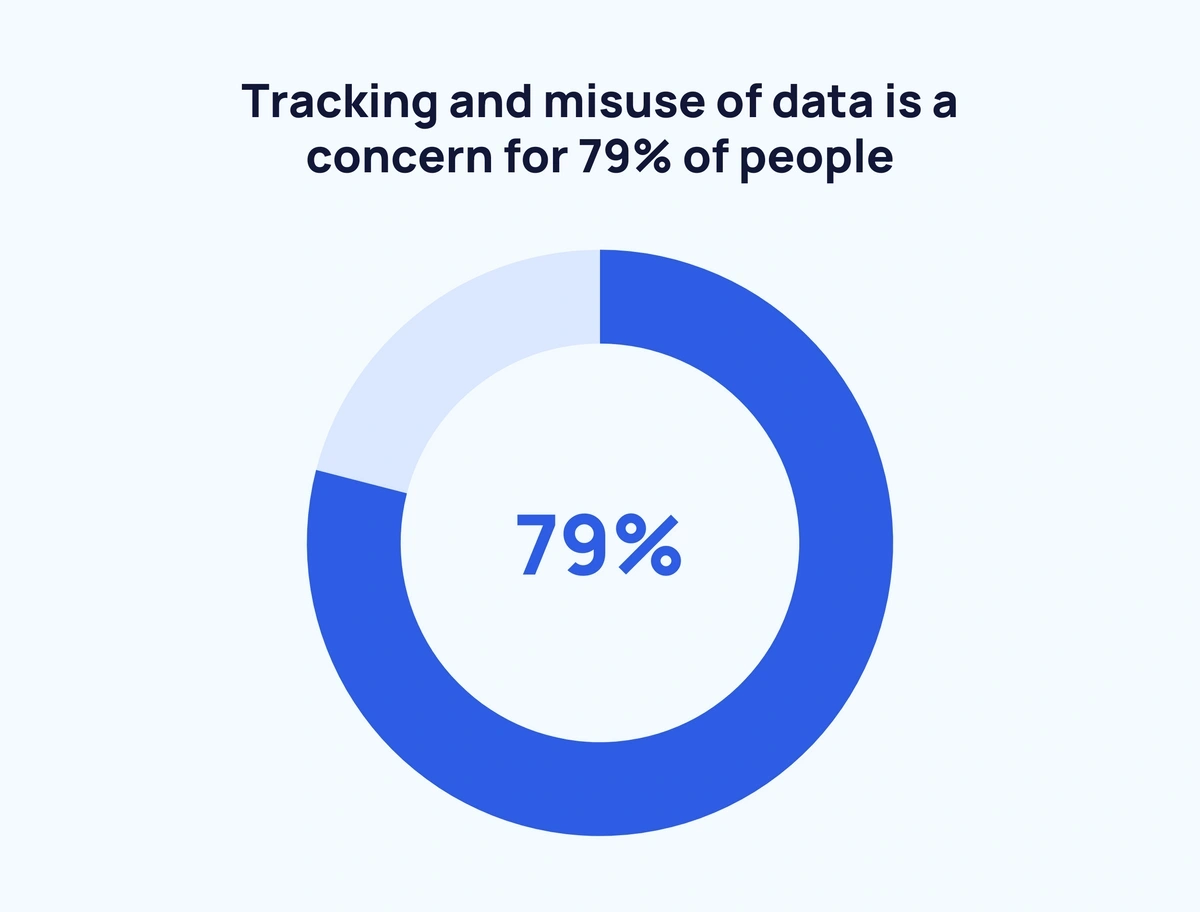Get Advanced Insights on Any Topic
Discover Trends 12+ Months Before Everyone Else
How We Find Trends Before They Take Off
Exploding Topics’ advanced algorithm monitors millions of unstructured data points to spot trends early on.

Features
Keyword Research
Performance Tracking
Competitor Intelligence
Fix Your Site’s SEO Issues in 30 Seconds
Find technical issues blocking search visibility. Get prioritized, actionable fixes in seconds.
Powered by data from
Number of Metaverse Users in 2025
The multi-billion dollar metaverse market is set to explode.
For the most part, metaverse applications are focused on gaming, but several other industries are exploring possibilities.
With the user base expanding, we’ll take a look at how many metaverse users there are and other related statistics.
Contents
- Top Metaverse User Stats
- How Many Metaverse Users Are There in 2025?
- Metaverse Growth Projection
- Metaverse Familiarity and Reach
- Metaverse Users Demographics
- Feelings Towards the Metaverse
- Metaverse Concerns
- Metaverse Benefits
Top Metaverse User Stats (Editor’s Choice)
- There are roughly 400 million monthly metaverse users
- By 2030, there could be as many as 5 billion metaverse users
- Around 7 in 10 US adults are aware of the metaverse
- Men are almost 3x more likely to be interested in the metaverse than women
- 80% of metaverse users are under 16
- 33% of adults are curious about the metaverse
How Many Metaverse Users Are There in 2025?
Based on figures gathered from the most popular metaverse platforms, there are approximately 700 million monthly active metaverse users.
Source: New World Notes
Metaverse Growth Projections
The metaverse market is expected to explode over the coming years, growing at a CAGR of 48%.
The industry’s 2023 valuation of $83.9 billion is set to grow by over 15x in the space of seven years, reaching $1.3 trillion by 2030.
With that, the number of metaverse users is also likely to rocket.
A 2022 Citi report claims that by 2030, there could be as many as 5 billion metaverse users (including the mobile phone user base) worldwide.
However, when using a more zeroed-in definition of the metaverse (VR/AR device user base), this figure is likely to be closer to 1 billion.
Want to Spy on Your Competition?
Explore competitors’ website traffic stats, discover growth points, and expand your market share.
Sources: MarketsandMarkets, Citi
Metaverse Familiarity and Reach
As of January 2022, 69% of US adults had heard of the metaverse.
Yet, only 38% are at least somewhat familiar. And just 14% are very familiar.
Here’s the full breakdown of metaverse familiarity:
|
Metaverse Familiarity |
Proportion of Respondents |
|
Very Familiar |
14% |
|
Somewhat Familiar |
24% |
|
Heard of But Not Familiar |
31% |
|
Never Heard of |
31% |
By 2026, it’s predicted that 1 in 4 people worldwide will spend upwards of one hour a day in the metaverse.
Activities are likely to include:
- Work
- Shopping
- Education
- Social interaction
- Entertainment
In fact, a 2021 survey revealed that 66% of US adults believe that the metaverse can at least partially replace social media.
And nearly 1 in 4 of those surveyed (24%) think the metaverse will completely replace social media.
Metaverse Users Demographics
Gender
According to 2022 research, men are considerably more interested in the metaverse than women.
Of those surveyed, 18% of men are very interested in the metaverse – 11% more than women.
Here’s a breakdown of metaverse interest by gender:
|
Gender |
Very Interested |
Somewhat Interested |
Not That Interested |
Not Interested At All |
|
All Adults |
12% |
24% |
20% |
43% |
|
Men |
18% |
28% |
19% |
35% |
|
Women |
7% |
21% |
21% |
50% |
Age
In total, 4 in 5 metaverse users are under 16 years old.
Millennials are the most likely generation to attend a live sporting event or live music event in the metaverse. In total, 41% of millennials are at least somewhat interested in a live metaverse sporting event. And 61% are somewhat interested in a metaverse live music event.
Here’s how generations compare in terms of live metaverse event interest:
Live Metaverse Sporting Event Interest
|
Generation |
Very Interested |
Somewhat Interested |
Not That Interested |
Not Interested At All |
|
All Adults |
15% |
23% |
14% |
48% |
|
Gen Z |
16% |
31% |
15% |
38% |
|
Millennial |
27% |
29% |
14% |
30% |
|
Gen X |
13% |
24% |
16% |
47% |
|
Baby Boomers |
4% |
15% |
14% |
67% |
Live Metaverse Music Event Interest
|
Generation |
Very Interested |
Somewhat Interested |
Not That Interested |
Not Interested At All |
|
All Adults |
18% |
27% |
14% |
41% |
|
Gen Z |
24% |
32% |
14% |
30% |
|
Millennial |
29% |
32% |
13% |
27% |
|
Gen X |
16% |
29% |
17% |
38% |
|
Baby Boomers |
7% |
18% |
14% |
61% |
Sources: Morning Consult, Metaversed, Morning Consult (2)
Feelings Towards the Metaverse
It’s fair to say that current metaverse perceptions are mixed.
The top response in a recent survey indicated that 30% of US adults think the metaverse is “not as good as real life”.
While 26% believe the metaverse is “the future of technology”.
And 23% cynically think that the metaverse is merely a means for tech companies to make money.
Here’s the full rundown of metaverse views:
|
View on the Metaverse |
Respondents Who Agree |
Positive/Negative |
|
Not as good as real life |
30% |
Negative |
|
The future of technology |
26% |
Positive |
|
Tech companies trying to figure out a way to make money |
23% |
Negative |
|
A big risk to personal privacy |
20% |
Negative |
|
A really exciting way to play and socialize |
18% |
Positive |
|
A way to intensify enjoyable experiences |
13% |
Positive |
|
A fad that will not last long |
11% |
Negative |
|
Something for young people only |
11% |
Negative |
|
A better alternative to real life |
10% |
Positive |
|
How we will do most of our shopping in the future |
9% |
Positive |
|
Will create more equality in society |
9% |
Positive |
|
A scam or predatory financial scheme |
6% |
Negative |
|
None of these |
11% |
Neutral |
Feelings towards the metaverse are similarly mixed:
|
Feelings Towards the Metaverse |
Respondents Who Agree |
Positive/Negative |
|
Curious |
33% |
Positive |
|
Uninterested |
27% |
Negative |
|
Suspicious |
23% |
Negative |
|
Concerned |
19% |
Negative |
|
Indifferent |
19% |
Neutral |
|
Excited |
18% |
Positive |
|
Optimistic |
16% |
Positive |
|
Confused |
12% |
Negative |
|
None of these |
7% |
Neutral |
When it comes to metaverse adoption, the most important factor for many is lower-priced VR headsets. In fact, 50% of respondents claim that it is at least somewhat important to have lower-priced VR headsets available.
Other important considerations include larger amounts of content and family and friends using the metaverse.
Here’s how five key factors rank in terms of importance when deciding whether to use the metaverse:
|
Factor |
Very important |
Somewhat important |
Not too important |
Not important at all |
|
Lower-priced VR headsets |
24% |
26% |
14% |
36% |
|
Larger amounts of content |
15% |
25% |
18% |
42% |
|
Family and friends using it |
14% |
25% |
18% |
43% |
|
Government regulations |
14% |
22% |
20% |
45% |
|
Workplace using it |
11% |
19% |
16% |
54% |
Sources: Ipsos, Morning Consult
Metaverse Concerns
As alluded to above, internet users have several reservations about the metaverse.
For example, tracking and misuse of data is a concern for as many as 79% of people.
While online abuse and cyberbullying on the metaverse worries 7 in 10 internet users.
Below is a breakdown of metaverse concerns:
|
Concern |
Major Concern |
Minor Concern |
Not a Concern At All |
|
Tracking and misuse of personal data |
55% |
24% |
21% |
|
Online abuse and cyberbullying |
44% |
26% |
30% |
|
Personal safety |
39% |
28% |
33% |
|
Sexual harassment |
38% |
23% |
39% |
|
Moderation of offensive or damaging behaviour |
37% |
29% |
34% |
|
Impacts on mental health |
35% |
27% |
38% |
|
Motion sickness from VR headsets |
29% |
31% |
41% |
|
The environmental impact from energy consumption |
28% |
32% |
40% |
Some of these metaverse concerns are echoed in a 2021 survey.
Almost half of all respondents (47%) expressed worries about addiction to a simulated reality. Privacy issues (41%) and mental health issues (41%) are also significant perceived threats.
Sources: Morning Consult, PC Magazine
Metaverse Benefits
Potential concerns notwithstanding, there are various reasons for joining the metaverse.
The most popular reason is for work possibilities (52%), followed by art and live entertainment (48%), and money investment (44%).
Other popular reasons include:
- Education – 40%
- Online dating and socializing – 32%
- Gaming – 29%
- Adult entertainment – 18%
Evidently, there are many benefits to the metaverse, too.
Approximately 2 in 5 people (39%) agree that overcoming obstacles such as disabilities is the no.1 benefit of the metaverse.
Here are the top metaverse benefits:
|
Leading Metaverse Benefits |
Internet Users Who Agree |
|
Overcoming obstacles |
39% |
|
Enhancing creativity and imagination |
37% |
|
Traveling the world without moving |
37% |
|
Increasing technological literacy and skills |
34% |
|
Connecting with new people without feeling awkward |
34% |
|
Creating completely new opportunities job opportunities |
30% |
|
Meeting your loved ones whenever you want |
30% |
|
More possibilities in education |
29% |
|
Giving opportunities for self-expression |
27% |
Sources: PC Magazine, Tidio
Key Takeaways
Although the general public may not be totally on board with the metaverse just yet, the number of users speaks for itself.
This is undoubtedly a growing space with bags of potential.
If you enjoyed these metaverse-related stats, take a look at Most Visited IT Websites, Top Technology Trends, and Important Computer Science Trends.
Stop Guessing, Start Growing 🚀
Use real-time topic data to create content that resonates and brings results.
Exploding Topics is owned by Semrush. Our mission is to provide accurate data and expert insights on emerging trends. Unless otherwise noted, this page’s content was written by either an employee or a paid contractor of Semrush Inc.
Share
Newsletter Signup
By clicking “Subscribe” you agree to Semrush Privacy Policy and consent to Semrush using your contact data for newsletter purposes
Written By


Fabio is a research associate at Exploding Topics. Since 2021, Fabio has researched, written, and edited articles for the Explo... Read more








